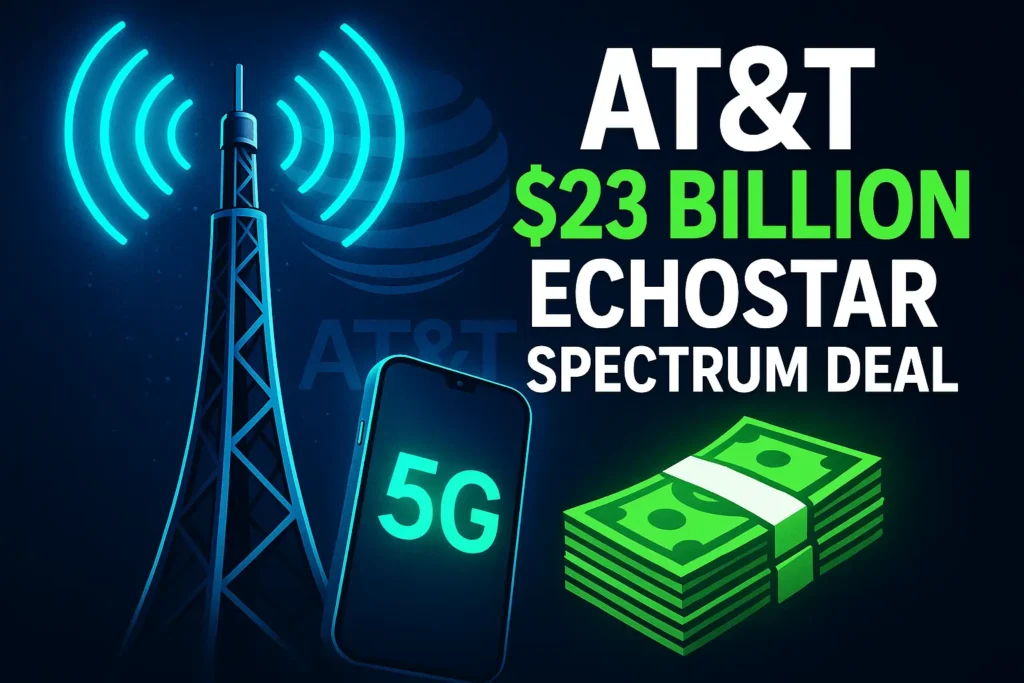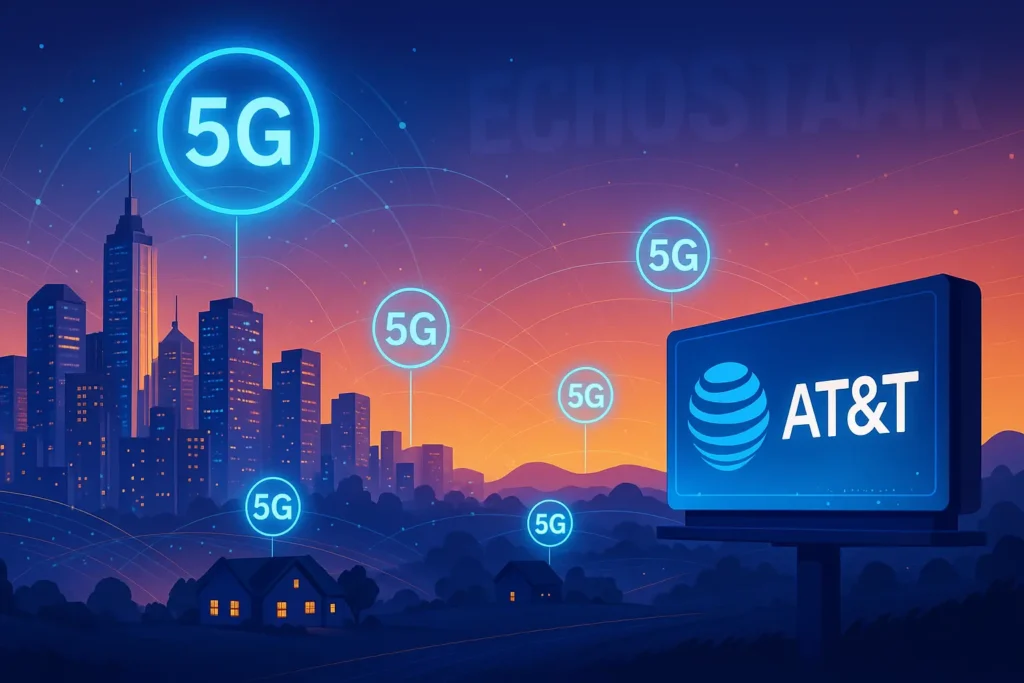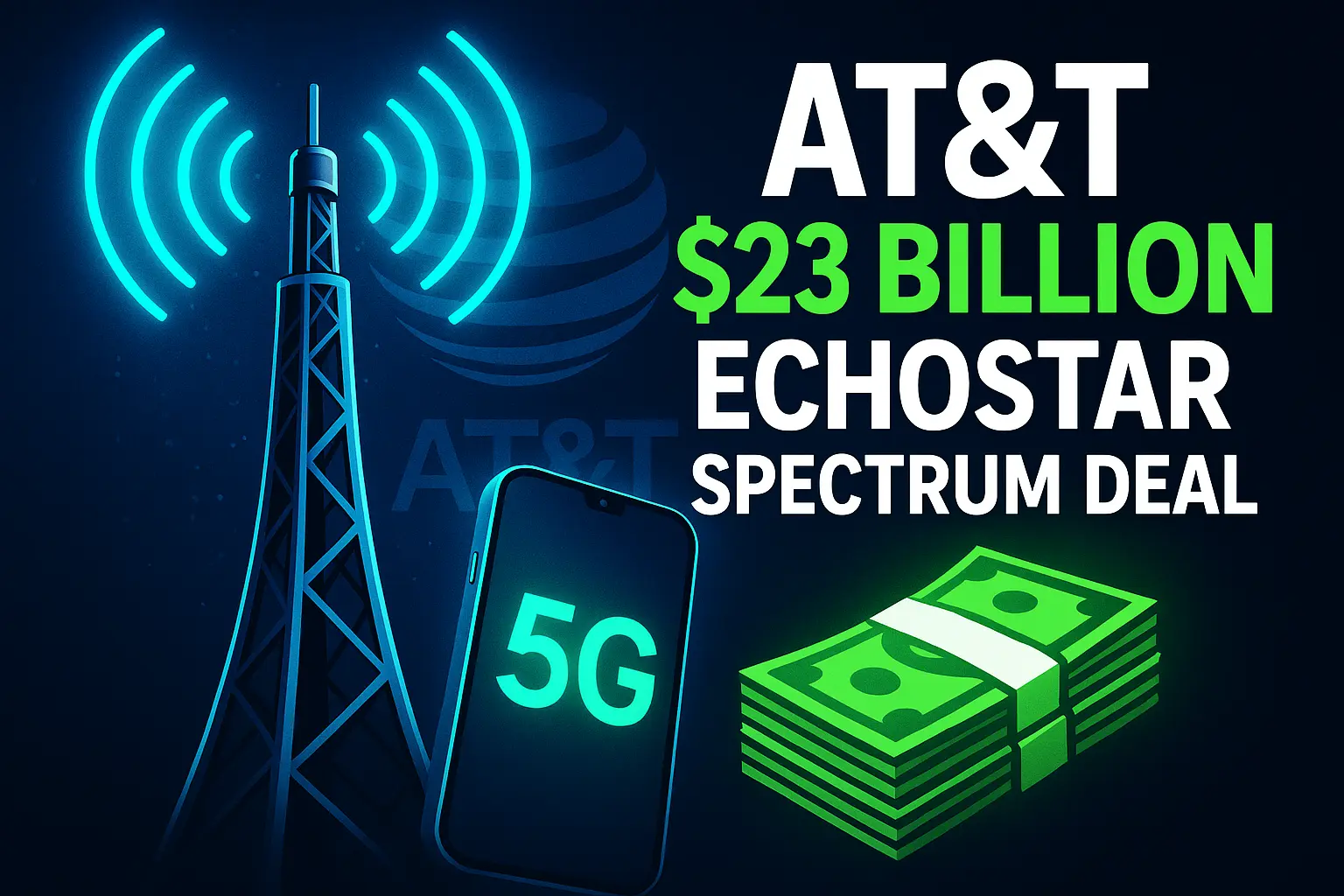How this massive deal could boost your cell service and reshape the U.S. telecom landscape
Here’s the deal: AT&T just dropped a bombshell announcement that they’re buying up key wireless spectrum licenses from EchoStar for about $23 billion in cash. This isn’t some small potatoes transaction – it’s a big move that adds serious firepower to AT&T’s network capabilities across the country. If you’re tired of spotty coverage or slow speeds, this could actually make a difference in your daily scrolling and streaming.
So basically, EchoStar – the parent company of Dish Network – has been sitting on this valuable spectrum but facing some heat from regulators to either use it or lose it. They’ve got build-out deadlines from the FCC tied to past acquisitions, and selling off these licenses helps them cash in while avoiding penalties. AT&T, on the other hand, sees this as a smart way to beef up their 5G game without building a ton of new towers from scratch.

What’s Actually Happening
The agreement came out today, with AT&T snapping up spectrum that covers pretty much the entire U.S. It’s all about low-band and mid-band frequencies, which are gold for wireless carriers because they balance range and speed. EchoStar’s stock? It shot up 75% on the news, which tells you investors think this is a lifeline for the company. Meanwhile, AT&T says this fits right into their plan to lead in 5G and even expand fixed wireless internet options for homes.
The way I see it, this deal stems from EchoStar’s ongoing struggles. After merging with Dish and picking up Boost Mobile, they’ve racked up debt and missed some deployment targets. Regulatory pressure has been building – think FCC rules from deals like the Sprint-T-Mobile merger that required Dish to step up as a fourth national carrier. Selling to AT&T lets them pay down bills and keep operating, but it might dial back their ambitions in the mobile space.
The Key Findings
Let’s break this down with some hard numbers from the official announcements. AT&T is getting an average of 50 MHz of spectrum nationwide, split between low-band (great for wide coverage) and mid-band (solid for speed in cities). This covers over 400 markets, which is basically everywhere you might need a signal.
Here’s a quick table showing what AT&T’s gaining:
| Spectrum Band | Amount (MHz) | Type | Key Benefit |
| 600 MHz | 20 | Low-band | Better penetration in rural areas and buildings |
| 3.45 GHz | 30 | Mid-band | Faster 5G speeds in urban spots |
This isn’t just theoretical – AT&T claims it’ll help them roll out better service without as much new infrastructure, saving costs in the long run. The deal’s expected to close in mid-2026, pending approvals from the FCC and DOJ, who’ll scrutinize it for competition issues.
Why This Matters to You
Ever been in the middle of a video call and suddenly you’re pixelated? Or streaming a game and it lags at the worst moment? For AT&T’s 100 million-plus customers, this spectrum boost could mean more reliable 5G, fewer dead zones, and even faster home internet alternatives like AT&T Internet Air.
But it’s not all upside. If you’re with Verizon or T-Mobile, this might push them to make their own moves, keeping the market competitive. On the flip side, EchoStar selling off assets could weaken their push as a budget-friendly option through Boost Mobile, potentially leading to higher prices down the line if consolidation goes too far. The thing is, in a world where we’re all glued to our phones, more spectrum generally means better experiences for everyone – as long as regulators keep an eye on monopolies.
5 Things Worth Knowing
- The price tag is huge, but strategic – At $23 billion, it’s one of the biggest spectrum deals in years, funded by AT&T’s cash reserves and some borrowing. They expect no hit to earnings for the first couple years, and it’ll actually boost profits by year three.
- EchoStar’s getting a debt lifeline – They’ll use the cash to slash their hefty debt load, which has been weighing them down since the Dish merger. This could stabilize Boost Mobile, but it means they’re less of a threat to the big three carriers.
- Regulatory hurdles ahead – The FCC and Justice Department will review this for antitrust concerns. Past deals like this have faced scrutiny, especially since Dish was supposed to challenge AT&T, not sell to them.
- Better for rural America? – That low-band spectrum is killer for covering vast areas, so if you’re in a small town or on the road, you might notice improvements in coverage sooner than city folks.
- Long-term wholesale twist – As part of the deal, AT&T’s extending a network-sharing agreement with EchoStar, letting Boost users roam on AT&T’s grid. This keeps EchoStar in the game as a “hybrid” operator without building everything themselves.

The Real Impact
This is actually pretty wild when you think about it – AT&T’s already a giant, and this deal cements their edge in the 5G race. It could accelerate the shift away from old-school cable to wireless home internet, which is great for cord-cutters. But let’s be real: while it promises better service, it also highlights how consolidated the U.S. telecom market is. With fewer players holding more spectrum, we might see less innovation or higher costs if competition slips.
That said, EchoStar needed this win. Their stock jump shows Wall Street’s relieved, but it underscores their challenges in competing with Verizon and T-Mobile. Overall, the impact feels positive for consumers in the short term, with potential drawbacks if it leads to more mergers. Have you noticed your service improving with past spectrum grabs? This could be similar, just on a bigger scale.
Bottom Line
If you’re an AT&T user, sit tight for potential upgrades by late 2026. For the rest of us, keep an eye on how this affects prices and options – it might push other carriers to step up. Either way, this AT&T EchoStar spectrum deal is a reminder that behind your phone’s signal bars, there’s a high-stakes game of musical chairs with invisible airwaves.
Further Reading
- AT&T’s official announcement on the EchoStar deal
- How EchoStar’s stock surged after the $23 billion spectrum sale
- Wall Street Journal breakdown of the AT&T-EchoStar transaction
- CNN’s take on what this means for wireless competition
- Reuters report on the deal’s details and timeline
- Yahoo Finance analysis of AT&T’s spectrum expansion
- Data Center Dynamics on the tech implications
Key Takeaways
- AT&T’s grabbing 50 MHz of prime spectrum to amp up 5G coverage and speeds nationwide – think fewer frustrations on the go.
- EchoStar cashes in to tackle debt, but it might limit their growth as a mobile challenger.
- Watch for regulatory green lights in 2026; if approved, this could make wireless home internet more viable for you.
- Bottom line: Better networks are coming, but stay informed on how deals like this affect your monthly bill and choices. If you’re shopping carriers, now’s a good time to compare plans.

